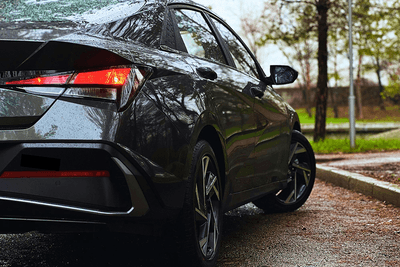Personal finance
Car loans


Financing the purchase of a new car
Buying a car is a significant decision, and for many people, it involves taking out a car loan. Understanding the different types of car loans and how they work can help you make the best choice for your financial situation. At Attain we can help guide you through the different options available and get you on the road as soon as possible.
Book a consultationHow to get a car loan
At Attain Loans, we specialise in finding the right car finance solution for your situation. Our service is typically at no charge as we're paid by the lender, and these payments don't influence our recommendations.
Choosing the right type of car loan
A car loan is a way to borrow money to purchase a vehicle. You agree to pay back the amount borrowed, plus interest, over a set period. This period typically ranges from one to seven years. The interest is the cost of borrowing the money, and it's usually expressed as an annual percentage rate (APR). Car loans come in several types, each with its own features.

Secured car loans
Secured car loans are the most common type. With a secured loan, your car serves as collateral for the loan. This means that if you can't make your payments, the lender has the right to take your car.
Because the loan is secured, lenders usually offer lower interest rates. They're taking on less risk because they can recover some of their money by selling your car if you default.
- Your car is security for the loan
- The lender can take your car if you don't pay
- Lower interest rates
- You can borrow more money
Unsecured car loans
Unsecured car loans don't use your car as collateral. The lender is taking on more risk, so these loans usually have higher interest rates. However, you don't risk losing your car if you can't make payments (though the lender can still take legal action to recover their money). Unsecured loans are less common for car purchases, but they might be an option if you have excellent credit.
- No security needed
- The lender looks at your credit and income
- You can use it for older cars
- Higher interest rates
- You might not be able to borrow as much

Fixed or variable rate vehicle loans
A car loan is a way to borrow money to purchase a vehicle. You agree to pay back the amount borrowed, plus interest, over a set period. This period typically ranges from one to seven years. The interest is the cost of borrowing the money, and it's usually expressed as an annual percentage rate (APR). Car loans come in several types, each with its own features.
Fixed rate car loans
When you get a fixed-rate car loan, your interest rate stays the same for the entire loan term. This means your monthly payments will always be the same amount. Fixed-rate loans are popular because they make budgeting easier. You always know exactly how much you need to pay each month.
- The interest rate stays the same
- Your payments don't change
- You know how much to pay each time
- Interest rate increases don't affect you
- You don't save if interest rates go down
Variable car loans
Variable-rate car loans have interest rates that can change over time. These changes are usually based on a financial index that goes up and down with the economy. With a variable-rate loan, your monthly payments could increase or decrease. These loans sometimes start with lower rates than fixed-rate loans, which can be attractive. However, they also come with the risk that your payments could go up in the future.
- The interest rate can change
- Your payments might go up or down
- You can save if interest rates go down
- It's often easier to make extra payments
- Your payments might go up
Questions about Car loans and finance
Get in touch and we will help you with any questions you have about car loans and advise you on the best way to get on the road.
Let us help with your questionsWhat is a secured car loan?
Secured car loans often come with several advantages. Because the loan is backed by an asset (the car), lenders typically offer more competitive interest rates compared to unsecured loans. They may also be willing to lend larger amounts and offer longer repayment terms, potentially reducing your monthly payments.
However, it's important to remember that while secured loans can be more affordable, they do come with the risk of losing your vehicle if you default on the loan. Always ensure you can comfortably meet the repayment schedule before committing to any loan.
Do I need a deposit for a car loan?
Some lenders offer no-deposit car loans, particularly for new vehicles. However, these loans often come with higher interest rates to offset the increased risk to the lender. They may also require you to pay Lenders Mortgage Insurance (LMI), which protects the lender if you default on the loan.
If you're struggling to save for a deposit, consider delaying your purchase to build up some savings. Even a small deposit can make a difference in your loan terms and overall costs.
What is a balloon payment?
For example, on a $30,000 car loan with a 20% balloon payment, you would make regular payments on $24,000 over the loan term, with a final payment of $6,000 due at the end.
Balloon payments can be attractive if you're looking to minimize your monthly expenses. They can also be useful if you expect your income to increase in the future, or if you plan to sell or refinance the vehicle before the balloon payment is due.
However, they come with risks. If you can't make the balloon payment when it's due, you might need to refinance (potentially at less favourable terms) or sell the car. Also, because you're paying off less of the principal during the loan term, you may end up paying more in interest overall.
Before choosing a loan with a balloon payment, carefully consider your future financial situation and ensure you have a plan for handling the final payment.
Can I pay off my car loan early?
Early repayment fees are designed to compensate the lender for the interest they'll lose if you pay off the loan ahead of schedule. These fees can sometimes outweigh the benefits of early repayment, especially if you're close to the end of your loan term.
If you're considering taking out a car loan and think you might want to pay it off early, it's worth discussing this with potential lenders before you apply. Some lenders offer loans specifically designed for borrowers who want the flexibility to make extra payments or pay off the loan early without penalties.
Remember, even if there is a fee for early repayment, it might still be financially beneficial in the long run if it significantly reduces the amount of interest you pay. It's worth doing the calculations to see if the savings outweigh the fee.
What is a comparison rate?
The comparison rate takes into account: The interest rate, Establishment fees, Ongoing fees (like annual or monthly account keeping fees), Any other charges related to the loan.
By law, lenders in Australia must display the comparison rate alongside their advertised interest rates for consumer loans. This allows you to more easily compare different loan products and understand their total cost.
For example, a loan might advertise an interest rate of 5%, but once all fees are factored in, the comparison rate might be 5.5%. Another loan might have a higher interest rate of 5.2%, but fewer fees, resulting in a comparison rate of 5.3%.
It's important to note that while comparison rates are useful, they're typically calculated based on a standard loan amount and term, which may differ from your specific circumstances. They also don't include all possible fees, such as late payment fees or break costs. Always read the loan terms carefully and consider seeking financial advice before committing to a loan.
How much can I borrow for a car loan?
As a general rule, many lenders prefer that your total debt payments (including your new car loan) don't exceed 30-40% of your gross monthly income. However, this can vary depending on the lender and your individual circumstances.
Your credit score also plays a significant role. A higher credit score can often lead to higher borrowing limits and better interest rates, as it demonstrates to lenders that you have a history of managing credit responsibly.
The value of the car you're planning to purchase is another important factor. Most lenders won't approve a loan for more than the value of the car, and many will only lend up to a certain percentage of the car's value.
It's important to remember that just because you can borrow a certain amount doesn't mean you should. Consider your budget carefully and ensure you can comfortably afford the repayments over the entire loan term.
Many lenders offer online car loan calculators or pre-approval processes that can give you an idea of how much you might be able to borrow based on your personal circumstances. These can be useful tools when you're starting your car buying journey.
Can I get a car loan if I am self-employed?
When applying for a car loan as a self-employed individual, lenders typically request additional documentation to verify your income. This may include:
- Tax returns for the past two years
- Business activity statements (BAS)
- Business bank statements
- Profit and loss statements
- A letter from your accountant
Some lenders offer low-doc loans specifically designed for self-employed borrowers. These loans typically require less documentation but may come with higher interest rates to offset the perceived increased risk.
To improve your chances of approval:
- Maintain good financial records: Clean, organized financial statements make it easier for lenders to assess your application.
- Build a strong credit score: A good credit history can help offset some of the perceived risk associated with self-employment.
- Provide a larger deposit: This can demonstrate your financial stability and reduce the lender's risk.
- Have a stable business history: Lenders typically prefer to see at least two years of successful self-employment.
It's worth noting that different lenders have different policies regarding self-employed borrowers. Some may be more accommodating than others, so it can be beneficial to shop around or consider using a mortgage broker who can help match you with lenders more likely to approve your application.
While it might require more effort, being self-employed doesn't disqualify you from getting a car loan. With the right preparation and approach, you can secure financing for your new vehicle.
What documentation do I need for a car loan application?
Can I get a car loan with bad credit?
Should I choose a secured or unsecured car loan?
Your full financial situation and requirements need to be considered prior to any offer and acceptance of a loan product. The information contained in this website is of a general nature and does not take in to account your personal needs and requirements.
Latest car and vehicle finance articles




Why choose Attain for your car loan?
Our expertise in vehicle finance means we can navigate the complexities of different loan types and lender requirements on your behalf. We focus on finding you not just a great rate, but the right loan structure to match your needs and circumstances.

We're family
We are a small family owned, Altona based business that understands your needs at different stages of your life.
We listen
Identifying your goals and finding services and products that meet your needs is our number one job, and we love it!
22 years industry experience
We know the intricacies of the mortgage market and can tailor mortgage solutions for your individual needs.
We have access to the very best lenders
Over 70 of them, including the majors. We're accredited, which means we are fully trained and know all the best options available for you.
Ongoing support
Even when we've found you a great deal we undertake regular reviews to see if we can find you something even better.
We're awesome!
We have an honest, client focused business model and we aim to create long lasting relationships built on trust and respect.
Our happy customers
Financial security gives you choices. It lets you move home, learn new things, travel, or start and grow a business. When you're financially secure, you can focus on what's important. Your family, health, and personal growth.




